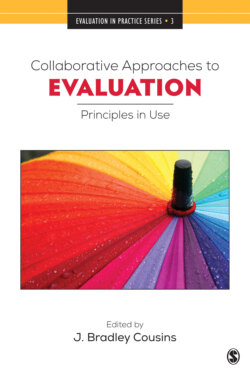Читать книгу Collaborative Approaches to Evaluation - Группа авторов - Страница 31
На сайте Литреса книга снята с продажи.
Conceptually Framing Research on Evaluation
ОглавлениеA while ago, an extensive review of 121 empirical studies on CAE was conducted, and it was observed that the vast majority of them took the form of reflective case narratives (Cousins & Chouinard, 2012). The review was extended to CAE in development contexts and similar results were found (Chouinard & Cousins, 2015). While reflective narratives offer considerable value for understanding complex psychosocial phenomena such as program implementation and impact, they are largely unverifiable given the propensity to underreport methods. We therefore have argued in favor of greatly expanding the range of research designs to gain a better understanding of practice and its implications for growing the evaluation knowledge base. The CAE principles implicitly provide a conceptual framework that may be entirely useful in this regard. We envision the development and utilization of qualitative, quantitative, and mixed-methods research designs to enable deeper understanding of the antecedents, practices, and consequences of CAE. Of particular interest would be comparative designs, where observations about the implementation of CAE in different contexts could be systematically informed. Longitudinal designs to chart the trajectory of relationships and other important considerations over time would also be of high value.
In the foregoing paragraphs, we have offered some suggestions about potentially powerful uses of the CAE principles not only to guide practice but to enable deeper understanding about CAE than is presently the case. In our opinion, the principles show great promise to stimulate dialogue and deliberation, analysis, and reflective practice in the field. But of course, the question as to their potential merit remains an empirical one. In the next section, we describe how we went about launching the principles, promoting them globally, and requesting collegial interest in field testing the principles.
